- Home
- Alison Weir
The Marriage Game Page 4
The Marriage Game Read online
Page 4
At the Tower she reined in her mount, steeling herself to enter the fortress where she had suffered three terrible months of incarceration, not five years ago. She forced herself to smile; she would not think of the past.
“When last I was here, good people,” she addressed the crowds, “it was as a prisoner, unjustly suspected of treason, and in fear of death. Now I give most hearty thanks to Almighty God who has spared me to behold this day!”
She said no word about her mother, whose blood had been shed here these twenty-two years past, but Anne Boleyn was much in her thoughts, and later that day she insisted on entering the Queen’s lodgings, which were the very rooms that Anne had occupied before her coronation and then, three short years later, in the days leading up to her execution. Here, in this same lodging, Elizabeth herself had languished during those desperate weeks when she expected daily to be summoned to the scaffold. She had always believed that her sister, knowing where Anne was held, deliberately intended that she should suffer this added refinement to her own punishment. And Elizabeth had been permitted—nay, encouraged—to take the air along the wall walk that overlooked the scaffold before the House of Ordnance, a scaffold built for Lady Jane Gray on the exact place where Anne Boleyn had perished; Elizabeth vividly remembered praying each day for it to be taken down.
The apartments had been cleaned, sweetened, and made luxurious with rich hangings and furnishings, but an air of misery pervaded them, and Elizabeth was glad to close the door on their faded antique grandeur, gratified to be staying in the former King’s chambers in the old royal apartments. These had been hung with silk tapestries threaded with gold and silver, and furnished with a magnificent canopy of estate edged with seed pearls and a great bed made up with rich stuffs. Beneath the canopy was a throne made for her father, Henry VIII—she recognized the pattern of the green damask—and there too was his footstool, on which he had once rested his poor diseased legs. God rest him, she thought, momentarily overcome by the poignant sight.
Lying wakeful at night in the vast bed, Elizabeth’s thoughts inevitably strayed to her mother and the grim pageant of traitors who had perished within these walls. It was only a short walk from the palace to the Chapel of St. Peter ad Vincula, where Anne lay ignominiously buried in an unmarked grave. Elizabeth wished she could have the poor remains translated to Westminster Abbey and given honorable burial in a fine marble tomb. But she remembered what Bacon had said. It would not be politic. It would be raking up matters best left forgotten.
She tossed, turned, curled up, then stretched, time after time. She could not sleep, her mind would not stop racing, and she could not abide the stink and noises that drifted through the drafty casement from the Tower menagerie. In the end, she rose from her bed, pulled on a heavy robe over her nightgown, pushed her feet into velvet slippers, and wrapped herself in a dark cloak. The maid on the pallet bed stirred, but Elizabeth bade her go back to sleep. She descended a small spiral stair and found herself in the freezing night air in the courtyard below the White Tower, which loomed massively above her. To her right was the Jewel House, and to her left the great bulk of the King’s Hall, where Anne had been tried and condemned to death. This night Elizabeth would honor her mother, as she had never had the chance to do before.
The yeomen of the guard keeping watch in the courtyard were astonished to see their queen abroad, unattended, in the dark hours before dawn, but they jumped to obey her determined command to open the great Coldharbour Gate, the only way out of the inmost ward that housed the palace complex. She bade them await her return, then set off with purposeful strides across Tower Green to St. Peter ad Vincula, which stood solid and lonely next to the great House of Ordnance. The door creaked as she pushed it open.
Inside, all was still. The only light came from the moonlit windows and the solitary flame in the sanctuary signifying the constant, reassuring presence of God. Elizabeth walked across the flagstones down the empty nave, a colonnade of pillars to her left. Ahead lay the altar steps. Reaching them, she knelt. She had been told that her mother and Katherine Howard had been buried before the altar, with the beheaded dukes of Somerset and Northumberland between them. She wished she knew which side Anne Boleyn lay. Never mind. Somewhere, just inches below her, was the arrow chest of elm in which her mother’s mangled remains had been interred on that tragic spring day in 1536.
As a good Protestant, Elizabeth was not supposed to pray for the dead. The practice had been condemned under her brother, the short-lived, zealous Edward VI, Jane Seymour’s son. But Elizabeth still preferred Archbishop Cranmer’s earlier version of the Book of Common Prayer, which did provide for such prayers, just as she was determined to keep the jeweled crucifixes in her chapels, which some hard-line reformers and Puritans had denounced as graven idols. She had resolved to do as her conscience dictated. Was it wrong to derive some comfort from praying for the dead? Who knew, it might do the dead some good. And so she folded her hands, composed her mind to tranquillity, and recited over and over again Cranmer’s beautiful prose: “I commend into Thy mercy Thy servant Anne, who is departed hence from us with the sign of faith and now doth rest in the sleep of peace: grant unto her, I beseech Thee, Thy mercy and everlasting peace.”
It felt strangely comforting to be here, near the mother she could barely remember. Kat had often told her how Anne had loved her and taken pride in her. How terrible it must have been for Anne—nay, beyond terrible—to leave behind her little child, not knowing what that child would come to believe of her; and knowing that she would not be there to shield and protect Elizabeth from the troubles that would arise from being declared a bastard and left motherless. Anne’s marriage to the King had been declared invalid just two days before her execution, so she had gone to the scaffold knowing of the terrible legacy she had bequeathed to her daughter. Kat reckoned that, having been condemned to be burned or beheaded at the King’s pleasure, she had been offered the kinder death in return for her consent that her marriage be dissolved. And who could have blamed her for accepting?
A wondrous sense of peace stole over Elizabeth as she knelt on the altar steps, as unexpected as it was comforting. It was as if someone unseen knelt beside her, emanating love and acceptance and joy. It had been her willing imagination, she told herself as she walked back to the palace, yet there remained a strong conviction in her heart that God had answered her prayers, that her mother had come to her, bringing healing and peace to her troubled soul.
1559
In January, Elizabeth went to her crowning in Westminster Abbey. The day before, she had gone in procession through the teeming streets of London to the rejoicing of the citizens who had thronged to see her. Every house had been hung with tapestries, painted cloths, or garlands of evergreens; all the church bells rang out, music echoed from every street corner, and the crowds were dense. Lord Robert had organized the procession, the ceremonies, and the lavish pageants set up along the way for the Queen’s entertainment. Bless him, he had even arranged for the lifelike figures of her parents, King Henry and Queen Anne, to be displayed in a tableau exalting her royal descent. She blinked away tears from her eyes at that—and when a man pointed at her and cried, “Remember old Harry the Eighth? Here he is, come back to us!” Again and again she thanked the citizens for their warm welcome. “I shall be as good to you as ever queen was to her people,” she promised, and they loved her for it.
It was snowing when she walked to the Abbey wearing a heavy mantle of embroidered silk lined with ermine over her coronation robes, those same robes her sister had worn five years before. Hundreds of candles illuminated the distinguished throng and flashed fire on the jewels of the regalia and the gold threads in her father’s priceless tapestries, commissioned from the great painter Raphael, which hung in the church. When the bishops presented Elizabeth to her subjects, there were such shouts of acclaim and such a crescendo of sound from the organ and trumpets that the ancient building almost shook to its foundations. Symbolically chosen, sworn and an
ointed, Elizabeth was lifted up into the ancient coronation chair and the crown was raised above her. As it was placed upon her head, she thought of both her father and her mother, and knew a moment of indescribable exultation. She was truly a queen now, invested by God to rule. This crown had been hard-won, and none should ever take it from her.
Ten days later, again wearing her coronation robes, Elizabeth opened her first Parliament, seated majestically in a chair padded with cloth-of-gold cushions beneath the royal canopy of estate. But it seemed that barely had she taken off those robes afterward, having left both houses to their debating, than the Speaker and a deputation from the House of Commons were begging an audience at Whitehall.
Reluctantly she came to her presence chamber. Its walls and pillars were carved and gilded with gold leaf, its black-and-white marble floor spread with the costliest of Turkey carpets. Against this magnificent backdrop Elizabeth made a striking contrast in her carefully chosen dress of virginal white. As she ascended her throne, looking like a goddess, the members of Parliament fell to their knees in awe before her.
“Sir Thomas Gargrave,” she said, indicating to the Speaker that she was ready to listen to him. As ready, that was, as she would ever be. Love her commons she did, but her Commons might prove another matter!
“Your Majesty, we come to present a petition from the House of Commons,” he replied, looking nervous. He swallowed audibly. “We believe it would be best for you and your kingdom if you were to marry a consort who could relieve you of those duties that are fit only for men.”
Elizabeth bridled, but said nothing. Out of the corner of her eye she noticed Robert Dudley standing among the watching courtiers, gazing at her intently, and Cecil, frowning and nodding. Her irritation increased.
Sir Thomas advanced into the fray, unheeding of his sovereign’s mutinous look. “Princes are mortal, but kingdoms are immortal. If your Majesty remains unmarried and, ah, a Vestal Virgin, so to speak, it would be contrary to the public interest.”
Elizabeth forced herself to be civil, although the Speaker’s assertion that her royal duties were fit only for men had made her see red, and she was fighting down the urge to box the man’s ears.
“This is a matter most unpleasing to me,” she said, “but what does please me is the good will of you, my faithful Commons, and all my people.” She glanced again at Dudley and Cecil, noting that both were listening avidly. “I have chosen to stay unwed, even though great princes have sought my hand. I consider myself already bound to a husband, which is the kingdom of England.” As she extended her finger with her coronation ring elegantly displayed, her fiery gaze encompassed all in the room. “Every one of you, and indeed all Englishmen, are children and kinsmen to me. Sirs, I will do as God directs me. I have never been inclined toward marriage, but I do not rule it out completely. I promise you, this realm shall not remain destitute of an heir. But in the end, this may be sufficient for me, that a marble stone shall declare that a queen, having reigned such and such a time, lived and died a virgin.”
So saying, she nodded to the kneeling deputation and left the presence chamber without giving the Speaker the chance to answer her. Cecil watched her retreating back, detecting in every sweeping movement her barely contained fury. He knew that he must go after her and, whether she liked it or not, remind her of the desperate jeopardy in which she would find herself if she did not marry soon. This course she had chosen was madness!
He caught up with her in the gallery that led to her private lodgings.
“Madam, madam,” he sighed in some agitation, “a word if I may.”
Elizabeth led the way into the deserted council chamber.
“Yes, William?” Her eyes were wary. She knew what was coming.
“Madam, if you do not marry, there will be no heirs of your body to carry on the succession.”
“And if I do, William, any son of my body would not lack for supporters who might conspire to overthrow me, a mere woman—and who would trouble to gainsay him?” Her eyes bored into those of Cecil, who was unable to answer her.
“Madam, I beg of you, please consider. If you do not bear children, who will succeed you? This Parliament will turn England Protestant. I need not remind you that your nearest heirs are Catholics.” Elizabeth glared at him, but she knew he was right. There was Mary, Queen of Scots, now calling herself Queen of England, with the might of France behind her, even though she was a foreigner and could never by law succeed here. But the French would not care for such niceties. Elizabeth conceded—although nothing would make her admit it openly—that Lady Katherine Gray had the better claim, but she was a dangerous nuisance, flirting with Spain, so obviously hoping that King Philip would press her to name her as successor.
As if he could read her thoughts, Cecil said, “Do you want Lady Katherine Gray to succeed you?”
“Never!” Elizabeth snapped. “She is naught but a pretty flower that bends with the wind. No brain and no principles.”
“My thoughts exactly, madam. At least we agree on something.” Cecil made a rueful face. “My dearest prayer is that God will send you a husband, and by and by a son.”
“So that England has a king again!” Elizabeth exploded. “William, you are as transparent as air. Like most men, you see it as unnatural for a woman to rule. You want me consigned to the nursery so that my husband can rule in my name. Well, again I say, never!”
Cecil flushed. “Madam, I protest, I want no such thing. I am your most loyal subject. Did I not help you to secure your throne?”
“Aye, you did, and for that I am grateful. Never think I am not.”
“Then strengthen your position and take a husband, madam!”
Elizabeth’s eyes were like steel, her mouth set obstinately. “And whom do you suggest?”
“King Philip may ask for your hand.”
“Have you already forgotten how he was hated by my sister’s subjects? How he dragged England into his own ruinous wars, those same wars that cost us Calais, our last possession in France? Think how cruelly he abandoned Queen Mary!”
“I do not say you should accept his suit, madam, only that some great prince might be found, one who is prepared to forsake his country for yours and who would be your champion in matters of religion.”
“That rather narrows the field,” Elizabeth observed tartly. “There are few eligible Protestant princes in Europe. And if none suitable can be found, then I suppose you would have me marry a subject! What dangerous rivalries that would cause at court! Besides, it would demean my blood to stoop so low.”
Cecil sighed again. “Then, madam, how do you propose solving the problem of the succession?”
“God, and time, will solve it, believe me,” she replied, fizzing with irritation. “I have enough to deal with without your pestering me constantly with this—this trifle! I have a Church to establish; the Catholics and Puritans are making trouble; the French threaten us; the Protestants in Scotland urgently need my help; the Queen of Scots and Katherine Gray want my crown, and the treasury is still empty! I don’t have time to think of marriage!”
Fear was coursing through her blood. There were good and pressing reasons why she should stay single, but the very mention of marriage terrified her. There was only one person who came near to understanding, but even he, who had known her since she was eight, was not aware of the whole story.
“Walk with me awhile, Robin,” she said, tapping Dudley on the shoulder after coming across him idling in a gallery hung with maps and portraits. He willingly abandoned his scrutiny of Sebastian Cabot’s map of his North American discoveries, and followed her out of her lodgings as she strode into the privy garden, which was colorful with plants even at this time of year. Here, among the forest of painted columns surmounted by gilded heraldic beasts, with her shivering, fur-clad ladies keeping a discreet distance, they could be private together. Elizabeth did not feel the cold; she loved being out in all weather.
“You heard what my Commons said,” she began,
as she and Robert strolled along a path that led down toward the River Thames. “God’s blood, I do not see how I can marry and stay a queen! The husband holds dominion over the wife, the queen holds dominion over her subjects.” She turned to face him. “Robert, you know better than most what my life was like before God brought me a crown. I am free at last of all those who put me in danger or forced me to do what I did not want to do. I do not have to tread warily anymore. I like my power. I feel liberated. But what power, what freedom would I have if I married, tell me?”
“That would depend on whom you married,” Robert said, after considering for a moment. “Some men would consider themselves sufficiently lucky to win your sacred person, and would not ask for more.”
“Knowing men, I doubt it,” Elizabeth snorted.
“Then, Bess, may I suggest that you have not known the right men,” Robert ventured.
“Aye, maybe I have not,” she said, considering, refusing to take his bait. “But I need my councillors to understand that I have found the celibate life to be rather agreeable—and perhaps, Robin, as one who knows them well, you could convey that for me—and repeat it whenever the opportunity arises. I grow weary of wrangling with Cecil on the issue.”
“He cannot comprehend why you do not wish to wed, Bess. And, to be plain, neither can I.”
Elizabeth stopped. She looked distressed. “I cannot explain, Robin. I can only say that I would rather enter a convent or suffer death than be forced to renounce my virginity.”
Robert looked at her with sympathy, but there was a degree of skepticism in his gaze. There had been gossip that she was no virgin. He had wondered about that, the prospect arousing excitement in him rather than disapproval. Now here she was, saying she would rather die than marry—and she was not joking.

 Richard III and the Princes in the Tower
Richard III and the Princes in the Tower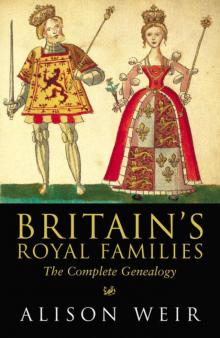 Britain's Royal Families: The Complete Genealogy
Britain's Royal Families: The Complete Genealogy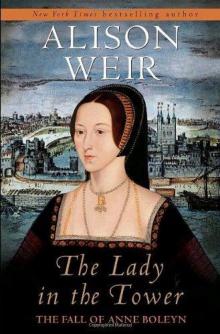 The Lady in the Tower: The Fall of Anne Boleyn
The Lady in the Tower: The Fall of Anne Boleyn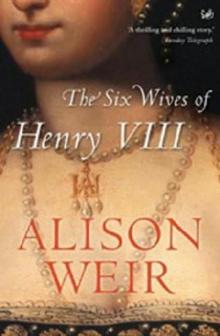 Six Wives of Henry VIII
Six Wives of Henry VIII Elizabeth of York: A Tudor Queen and Her World
Elizabeth of York: A Tudor Queen and Her World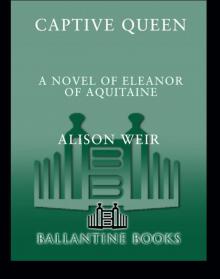 Captive Queen
Captive Queen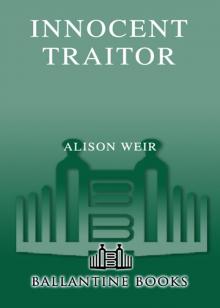 Innocent Traitor
Innocent Traitor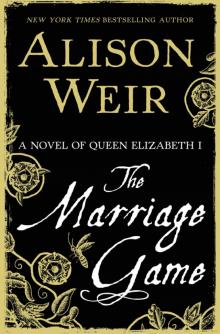 The Marriage Game
The Marriage Game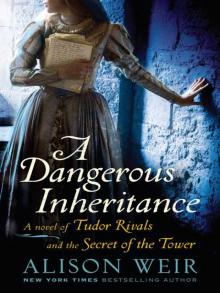 A Dangerous Inheritance
A Dangerous Inheritance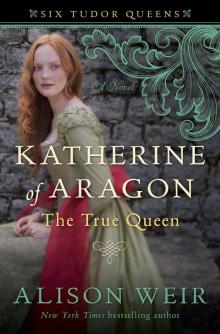 Katherine of Aragón: The True Queen
Katherine of Aragón: The True Queen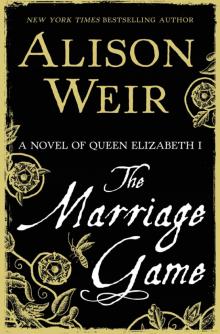 The Marriage Game: A Novel of Queen Elizabeth I
The Marriage Game: A Novel of Queen Elizabeth I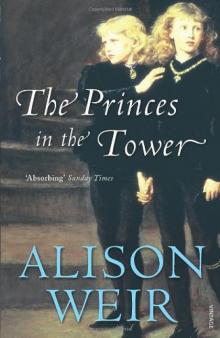 Princes in the Tower
Princes in the Tower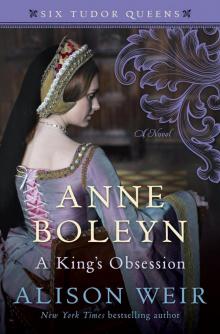 Anne Boleyn: A King's Obsession
Anne Boleyn: A King's Obsession Traitors of the Tower
Traitors of the Tower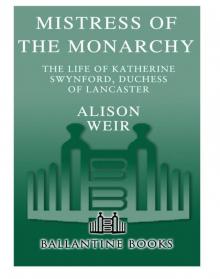 Mistress of the Monarchy: The Life of Katherine Swynford, Duchess of Lancaster
Mistress of the Monarchy: The Life of Katherine Swynford, Duchess of Lancaster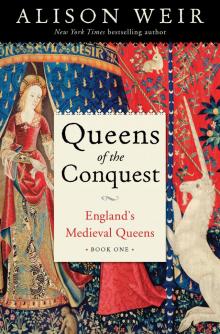 Queens of the Conquest: England’s Medieval Queens
Queens of the Conquest: England’s Medieval Queens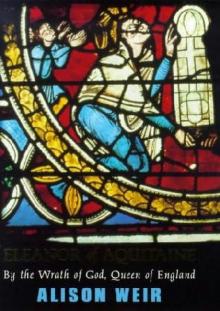 Eleanor of Aquitaine: A Life
Eleanor of Aquitaine: A Life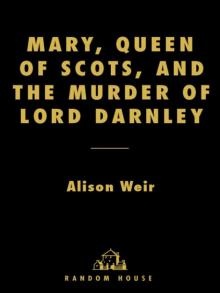 Mary, Queen of Scots, and the Murder of Lord Darnley
Mary, Queen of Scots, and the Murder of Lord Darnley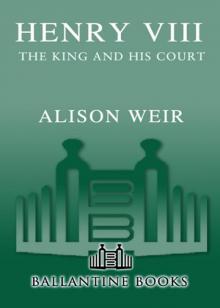 Henry VIII: The King and His Court
Henry VIII: The King and His Court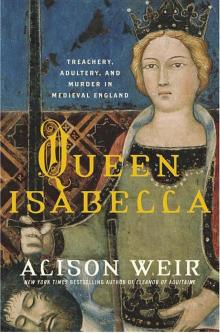 Queen Isabella: Treachery, Adultery, and Murder in Medieval England
Queen Isabella: Treachery, Adultery, and Murder in Medieval England Katheryn Howard, the Scandalous Queen
Katheryn Howard, the Scandalous Queen Arthur- Prince of the Roses
Arthur- Prince of the Roses The Wars of the Roses
The Wars of the Roses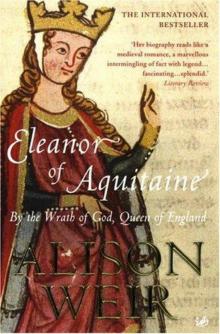 Eleanor of Aquitaine: By the Wrath of God, Queen of England
Eleanor of Aquitaine: By the Wrath of God, Queen of England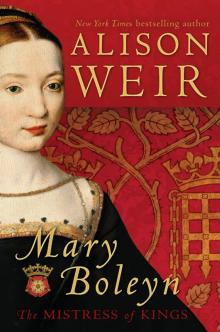 Mary Boleyn: The Great and Infamous Whore
Mary Boleyn: The Great and Infamous Whore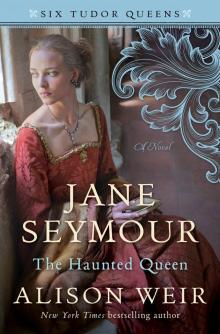 Jane Seymour: The Haunted Queen
Jane Seymour: The Haunted Queen Anna of Kleve, the Princess in the Portrait
Anna of Kleve, the Princess in the Portrait Lancaster and York: The Wars of the Roses
Lancaster and York: The Wars of the Roses The Grandmother's Tale
The Grandmother's Tale The Princess of Scotland (Six Tudor Queens #5.5)
The Princess of Scotland (Six Tudor Queens #5.5)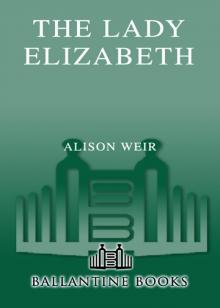 The Lady Elizabeth
The Lady Elizabeth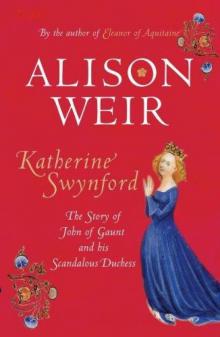 Katherine Swynford: The Story of John of Gaunt and His Scandalous Duchess
Katherine Swynford: The Story of John of Gaunt and His Scandalous Duchess The Curse of the Hungerfords
The Curse of the Hungerfords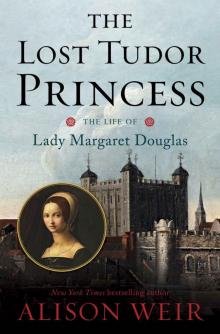 The Lost Tudor Princess: The Life of Lady Margaret Douglas
The Lost Tudor Princess: The Life of Lady Margaret Douglas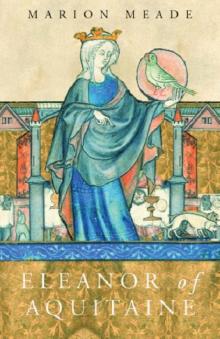 Eleanor of Aquitaine
Eleanor of Aquitaine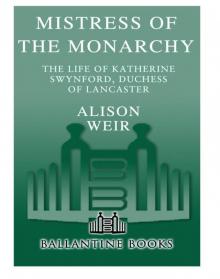 Mistress of the Monarchy
Mistress of the Monarchy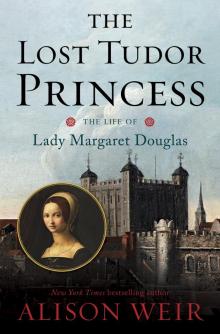 The Lost Tudor Princess
The Lost Tudor Princess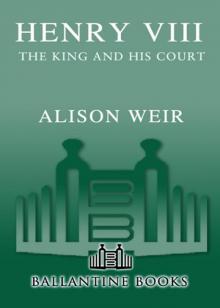 Henry VIII
Henry VIII Anne Boleyn, a King's Obsession
Anne Boleyn, a King's Obsession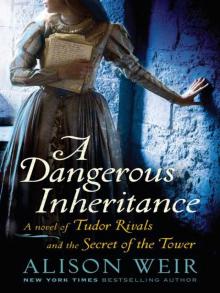 A Dangerous Inheritance: A Novel of Tudor Rivals and the Secret of the Tower
A Dangerous Inheritance: A Novel of Tudor Rivals and the Secret of the Tower Elizabeth of York
Elizabeth of York Katherine of Aragon, the True Queen
Katherine of Aragon, the True Queen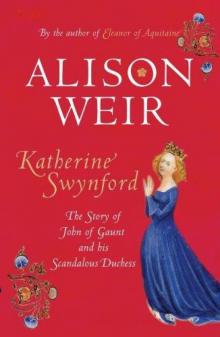 Katherine Swynford
Katherine Swynford Wars of the Roses
Wars of the Roses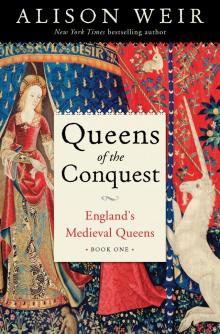 Queens of the Conquest
Queens of the Conquest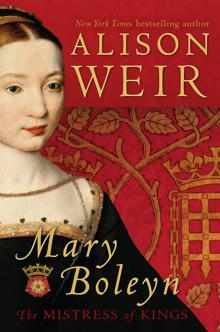 Mary Boleyn
Mary Boleyn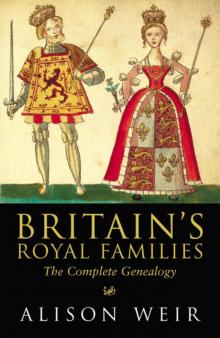 Britain's Royal Families
Britain's Royal Families The Tower Is Full of Ghosts Today
The Tower Is Full of Ghosts Today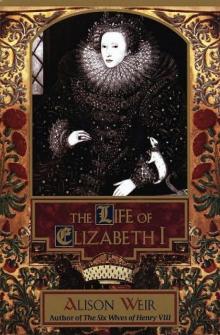 Life of Elizabeth I
Life of Elizabeth I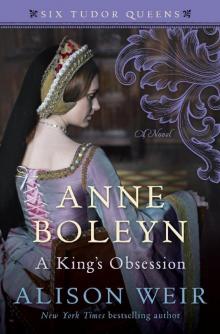 Anne Boleyn A King's Obssession
Anne Boleyn A King's Obssession Lancaster and York
Lancaster and York Jane Seymour, the Haunted Queen
Jane Seymour, the Haunted Queen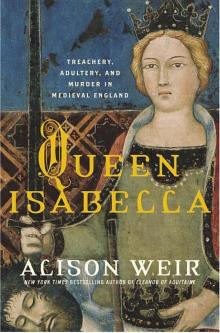 Queen Isabella
Queen Isabella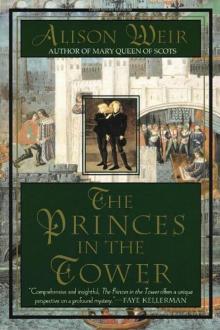 The princes in the tower
The princes in the tower